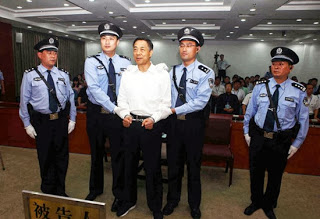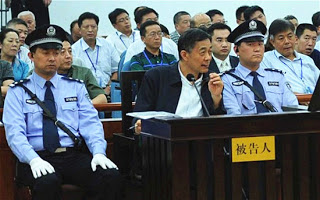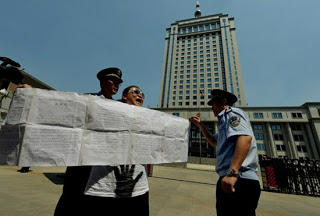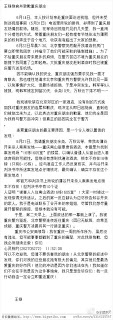[ 时间:2013-09-01 10:35:15 | 作者:Malcolm Moore | 来源:The Telegraph ]
As China boasted of its new "open" justice in the wake of the Bo Xilai trial, a woman is arrested for simply taking photographs of crowds outside the court.
Bo Xilai (front, C) standing trial for the third day at Jinan Intermediate People's Court Photo: EPA
By Malcolm Moore, Beijing6:00PM BST 31 Aug 2013 5 Comments
At the exact moment that China's "trial of the century" was reaching its climax, a peculiar and unsettling scene unfolded in the street a few hundred feet from the courtroom.
Inside, the maverick Chinese politician Bo Xilai, the Politburo member who once thought he might lead China, was coming face to face with his nemesis: Wang Lijun, the disloyal police chief who betrayed him first to American diplomats and then to the Chinese authorities.
But beyond the double line of policemen blocking the gate to the towering courthouse, beyond the plastic barriers penning in journalists, and beyond a line of red-and-white police tape sealing off the street, a 49-year-old woman was being secretly bundled into the back of a van.
The woman,
Yang Xiuqiong, a wealthy cooking oil merchant and Communist party member, had flown almost 1,000 miles to Jinan from her home city of Mianyang to witness as much of the historic trial as she could.
She did not see much, but she managed to photograph the motorcade that brought Mr Bo to court with her mobile phone.
She also snapped pictures of the small scuffles between Mr Bo's supporters and the police, as they waved banners calling for justice. Dozens of professional photographers outside the court captured similar scenes.
Within hours of these mundane photographs appearing on Sky Net, a Chinese website that catalogues problems in the justice system and which asked people to travel to Jinan and record their experiences of Mr Bo's trial, police from her home city had flown to Jinan, hunted her down and arrested her.
"Lots of people went. We told them just to take photographs and not to say anything or voice any opinions," said
Huang Qi, a spokesman for Sky Net.
"They have charged her with leaking national secrets. This may be the first case in China of a person facing criminal charges for taking pictures of a crowd."
In the wake of Mr Bo's trial, Chinese propaganda claimed that it had been a "watershed" moment for the Chinese justice system that "marked the Communist party's resolve to push forward the rule of law".
Mr Bo could face the death penalty if convicted for corruption and embezzlement and also faces a charge of abusing his power after he allegedly fired Wang Lijun, his police chief and tried to cover up the murder of Neil Heywood, a British businessman, by his wife Gu Kailai.
An editorial by Xinhua, the state news agency, said that a decision to allow the public to read transcripts from the court stenographer, tweeted while the trial was in progress, gave people "a rare opportunity to tell right from wrong".
But the detention of Mrs Yang lays bare how Mr Bo's trial, while unprecedented in many ways, should not be seen as a sign of any meaningful reform.
Chinese intellectuals have noted that the trial, like the downfall of the Gang of Four after the Cultural Revolution, is merely the outcome of a power struggle within the Communist party as Xi Jinping, the new president, consolidated his power, rather than a sign that the system is changing.
That struggle may still be continuing: on Friday reports emerged that Zhou Yongkang, China's former security tsar and a rank higher than Mr Bo, may be the next target.
At no stage were any serious questions asked, they said. From where did Mr Bo derive the power to crush his opponents and rise to the top? What kind of political party promotes leaders like Mr Bo? Why does China's political machine operate with such impunity and in near total secrecy? What reforms could stop such abuses?
Any dissidents who dare to touch on such uncomfortable areas are instantly detained: more than 100 have disappeared in the past few months.
Even as the authorities used Weibo, the Chinese version of Twitter, to stage a simulacrum of a real trial, they busily scrubbed any dissenting voices from the record. Of the 4,000 comments left on the Weibo account of Jinan court on the first day of the trial, only 22 were displayed.
Zhang Hongliang, a university professor in Beijing, saw his account closed after he posted: "Bo Xilai did not fail the people, and the people have not given up on him".
After 18 months of suspense, however, Mr Bo's trial certainly did provide a show for the masses. As the Chinese artist Ai Weiwei noted last week: "No preordained script could have come up with such a deliciously twisted drama."
The trial began with accusations that businessmen had greased Mr Bo's palm in order to win his support for a skyscraper project in the southern city of Shenzhen.
For the public, it was the first time that the Party, in releasing the court transcript, has acknowledged the incredibly cosy relationship between businesses and politicians.
Tang Xiaolin, an old friend from Mr Bo's Cultural Revolution days, not only allegedly left bags of bank notes sitting on his sofa, he also brought him hair conditioner from Hong Kong, electronic gadgets and toys for his son.
As the trial progressed, these titillating titbits began to pile up: the delicacies brought back from a holiday in Africa by Mr Bo's son, the £8,000 Segway bought as a present that Mr Bo took out for a spin, the 76 flights paid for his son and wife, the private jet to Kilimanjaro, all financed by the largesse of a billionaire businessman, Xu Ming.
Ordinary Chinese are all too aware of the gilded lives that their leaders enjoy: they watch them drive past in luxury cars every day. But here it was for the first time in black and white, a delicious reality show. "Even the worst television soap opera could not come up with such a plot!" Mr Bo exclaimed in his defence.
By the time the trial developed, on its last day, into a tale of a deadly love triangle between Mr Bo, his wife Gu Kailai, and his Police Chief Wang Lijun, everyone watching had been distracted from the worrying questions that the trial had failed to address.
Why, for example, did the prosecution choose only to present a tiny sliver of Mr Bo's alleged crimes in court?
"There was no mention of the crimes that Bo Xilai committed in Chongqing apart from his attempt to cover up Neil Heywood's murder," said Li Zhuang, a lawyer whom Mr Bo imprisoned for 18 months after he defended one of the politician's opponents.
During Mr Bo's five years of ruling over the central Chinese city of Chongqing, he had thousands of victims arbitrarily detained and many of them tortured, sometimes fatally, to extract false confessions before seizing their assets. Any judges or lawyers who opposed his version of "justice" were intimidated or jailed. So imperious was Mr Bo that he even reportedly ordered the electronic surveillance of top Communist party leaders such as former president, Hu Jintao.
"Hundreds of victims of his campaigns called me after the trial and voiced their dissatisfaction and anger at the court," said Mr Li. "What he did in Chongqing in the last four to five years is a sin far greater than what he did in Dalian."
Mr Li said he was hopeful that these crimes may eventually be aired, but of course to do so would reveal the complicity of other top Communist party leaders.
Tellingly, he added that when investigators had come to speak to him ahead of Mr Bo's trial, in order to collect evidence, they only asked him about his own case, not about the wider abuses of the regime.
Mr Bo's trial has also not ended the suffering of many of his victims in Chongqing. The wife of Gao Yingpu, a journalist locked up by Mr Bo, said he was still unable to speak publicly because he has been "stripped of his political rights".
The wife of Feng Ping, once a high-flying police captain who was targeted towards the end of Mr Bo's "anti-mafia" campaign, and who remains in Chongqing's Yuzhou prison, said she was still unable to speak about his case.
Deng Jiwei, the former legal consultant of the Chongqing government, said he was still in hospital recovering from the torture he received after being arrested in August 2010. Luckily for him, his trial was delayed several times and, when Wang Lijun, the Chongqing police chief, fled to the United States consulate in March 2012, he was promptly released.
"Sooner or later, these cases will come to light," he predicted. "When Bo Xilai's case is closed, there will be an official pronouncement on what he did in Chongqing," said Mr Deng.
Chi Susheng, Mr Deng's old classmate and lawyer, said she had many clients who were tortured under Mr Bo. "I asked the court to reopen these cases many times but always was refused," she said. "The investigators into Bo have not come to me or my clients to ask about his wrong doing," she added.
Much of the evidence against Mr Bo came in the form of witness statements, but Mr Bo was not able to cross-examine the most important testimony against him, that of his wife Gu Kailai.
"Mr Bo's repudiation and ridicule of [the testimony of other witnesses], indicated the type of experience Gu had been spared and the extent to which her testimony might have been modified or rebutted on cross-examination," noted Jerome Cohen, a law professor at New York University, in the South China Morning Post.
Then there remains the question of what was edited out of the court transcript, and whether such a transcript really does represent transparency.
One obvious edit came when Mr Bo claimed he had been acting on the orders of "higher-ups" when he obtained a medical certificate to show Mr Wang was mad.
An anonymous post on the internet, claiming to be the record of a "lawyer" who was present in the court, suggested that Mr Bo was threatened several times during his interrogation.
Mr Bo allegedly told the court that investigators had threatened to hunt down his son, 25-year-old Bo Guagua, and drag him back to China unless he cooperated, the post said, but no such claim appeared in the official transcript.
When Mr Bo recanted his earlier written statements, he also allegedly claimed he had made them because he had been promised he would be allowed to remain in the Communist party. That too, was not mentioned in the official script.
Han Deqiang, another prominent supporter of Mr Bo, said the authorities had miscalculated with their "live feed" of the court. "They must feel awkward," he said. "They wanted to show justice was being done, but this is a Western game and Mr Bo is very adept at playing these Western games.
"Now they have to find him guilty, but if they do, it will contradict the show they have put on for the public, that this is a procedurally just trial."
Mr Han pointed out that if the Chinese government really wanted transparency, it would have televised the trial live.
"The updated version of 'censorship' is no longer information blackout, but the dissemination of misinformation," said one source following the trial. "What I think is important is not what has been released, but what has not been released."
There also remains the intriguing possibility that Mr Bo was himself playing along with the show, as one last grateful nod to the organisation that had been his protector for so long. While his vigorous defence demonstrated the rule of law, he also refrained from criticism of the justice system, or the Party, or even his investigators, and he revealed none of the scandals of other leaders.
Upon his verdict, in a few weeks time, there is now the prospect that Mr Bo may appeal to a higher court, as he is legally entitled to do. But one thing is certain: if there is an appeal Mrs Yang, the citizen photographer, will not be allowed to witness it. She will still be in jail.
Additional reporting by Adam Wu








































